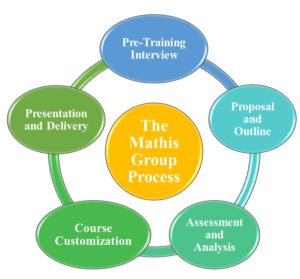The customization process will demonstrate that The Mathis Group, Inc. is prepared to write, customize, deliver, and manage your training with the highest quality team.
Design of program
Designing your program will take place using strong customization principles that will influence the participants with solid content and application.

Figure 1
-
Pre-Training Interview
-
Proposal and Outline
-
Assessment and Analysis of Organization
-
Course Customized
-
Presentation Delivered
Why is customization important?
Customization allows the course to be tailored to meet the particular needs of each organization. The Mathis Group believes each company has certain issues that are specific to it. Conducting a training course without understanding those differences will prevent successful changes in behavior or performance.
When true customization is complete, that skill base is specific and slanted to the targeted needs to that organizational culture.
How is the course customized?
You will notice in Figure 1 The Mathis Group Process. This process begins with a pre-training interview that gathers preliminary information. A general outline and proposal is developed and then followed by an assessment and analysis of your organization. Some of those needs will include culture, areas of strengths and weaknesses, application focus, and the best ways to implement the program.
Curriculum Design
Curriculum designers who have a thorough knowledge of the subject matter have designed the material. All consultants are seasoned professionals with years of experience. For all PMI registered courses, the designers hold a PMP® or PMI-ACP® certification.
This training program will focus on moving from the introduction of new skills to application for long term use. Each program must move beyond introduction toward application of those skills for long-term performance and behavior changes. Using different activities to reinforce the new skills reinforces application.
The following activities may be included in one or all of the training programs:
• Lecture/leader-led
• Discussion
• Reading
• Role play
• Case study
• Video/audio presentation
• Test/quiz
• Self assessment
